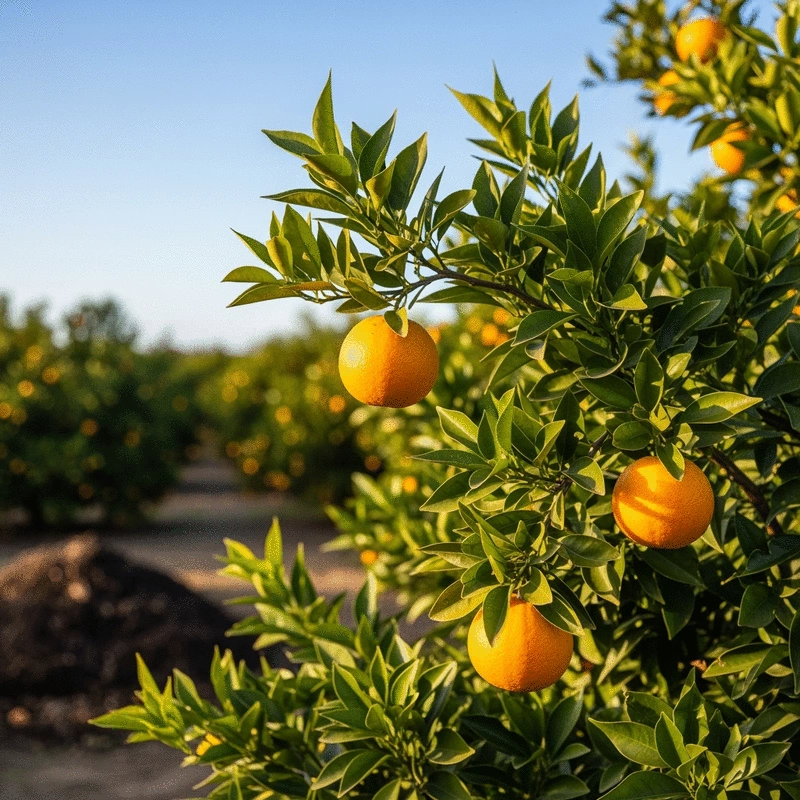Environmental Health
Protecting ecosystems, conserving water, and maintaining soil health.
What if every orange you consumed contributed to a healthier planet? Sustainable practices in agriculture not only boost crop quality but also nurture our ecosystems, offering a dual benefit for farmers and consumers alike. In the realm of orange farming, this approach is essential for adapting to environmental challenges while fostering community welfare. Let’s uncover the key insights into sustainable orange farming in Australia!
This section highlights the core pillars and benefits of sustainable orange farming practices in Australia.
Protecting ecosystems, conserving water, and maintaining soil health.
Ensuring farmers can sustain their operations while earning a fair income.
Supporting local communities and fair labor practices.
Sustainable practices help oranges withstand diseases and extreme weather.
As we explore the world of orange farming, one thing stands out: the importance of sustainability. At Orange Insights, I believe that sustainable practices not only benefit our environment but also enhance the quality of our crops. When we think about sustainability in agriculture, it involves more than just growing food; it's about fostering a healthy ecosystem that supports both our planet and our communities.
Sustainability in agriculture refers to practices that ensure the long-term health of the land, water, and resources while providing food for our growing population. It’s about using techniques that preserve the environment and promote biodiversity. This approach helps farmers adapt to changing weather patterns and promotes the welfare of local communities, which is especially vital in Australia, where diverse climates pose unique challenges.
To truly understand sustainable practices, let's break down what sustainability means in agriculture. It encompasses three main pillars: environmental health, economic profitability, and social equity. These pillars work together to create a balanced approach to farming that benefits everyone.
By focusing on these pillars, Australian orange farmers can cultivate their crops in ways that resonate with consumers who care about the environment, making sustainability a key driver of success.
Sustainable orange farming plays a crucial role in Australia’s agricultural landscape. The benefits are not just for farmers but extend to consumers and the environment alike! When we adopt sustainable practices, we are investing in our health and the health of our planet.
At Orange Insights, I'm passionate about sharing the knowledge that supports these practices. Sustainable orange farming is not just a trend; it’s a necessary shift towards a more responsible and rewarding way of cultivating our beloved oranges.
As we delve into regenerative farming techniques, we can discover how they promote sustainability in orange farming. These practices go beyond simply maintaining the land; they actively restore it. To ensure a thriving orange orchard, let's explore some effective techniques!
Did you know? Engaging with your local orange farmer and asking about their sustainable practices can lead to a deeper understanding of where your food comes from. Not only does this support local agriculture, but it also encourages farmers to continue adopting eco-friendly methods. Next time you visit a farmers' market, take a moment to discuss sustainability with the growers!
In Australia, government policies play a crucial role in shaping the landscape of sustainable agriculture. These regulations aim to encourage farmers to adopt practices that not only boost productivity but also protect our environment. At Orange Insights, we believe it's essential for both growers and consumers to understand how these policies can positively impact orange farming.
Current regulations often focus on reducing agricultural emissions, improving water management, and promoting biodiversity. Farmers who stay informed about these policies can better align their practices with government initiatives, fostering a culture of sustainability in the orange industry. For instance, the Australian citrus industry benefits from comprehensive resources like the Australian Plant Protection Guides, which offer valuable information on sustainable pest and disease management, contributing to overall farm biosecurity efforts as detailed in the Citrus Biosecurity Strategy 2023-2028 and the Biosecurity Manual for Citrus Producers.
One of the most effective ways to encourage sustainable farming is through incentives. These incentives can come in various forms, such as grants, tax reductions, or technical assistance. they help offset the costs associated with transitioning to more sustainable methods. Farmers can greatly benefit from these programs, as they often reduce financial barriers that may otherwise hinder their ability to implement eco-friendly practices.
Such incentives not only encourage the adoption of sustainable practices but also promote innovation in farming techniques. At Orange Insights, we are passionate about spreading the word on how these financial support systems can lead to greener and more productive orchards.
Certification programs are another vital aspect of promoting sustainability in agriculture. These programs recognize and reward farmers who adhere to strict environmental and social standards. For orange growers, being certified can enhance credibility and marketability. It assures consumers that their produce was cultivated with care for the environment and the community.
By participating in these certification programs, farmers not only demonstrate their commitment to sustainable practices but also gain access to premium markets. With growing consumer interest in ethically sourced products, certifications can significantly boost sales and community support.
As interest in sustainable orange farming grows, many questions arise regarding its implementation. It's essential to provide clear answers that help demystify sustainable practices for both farmers and consumers. At Orange Insights, I often find myself answering these FAQs, as understanding them can pave the way for a greener future.
The three core pillars are environmental health, economic profitability, and social equity. These work together to create a balanced approach to farming.
Sustainable practices enhance crop resilience against diseases and extreme weather, boost soil quality for better oranges, and promote biodiversity to naturally control pests.
Incentives include grants for soil improvement, tax incentives for renewable energy, subsidies for sustainable equipment, and support for research and development.
Key programs include Australian Certified Organic (ACO), Fair Trade Certification, Environmental Management System (EMS) standards, and Food Alliance Certification.
Farmers can measure impact by monitoring soil health, assessing biodiversity levels, evaluating crop yields and pest management outcomes, and calculating water usage and efficiency rates.
CSA initiatives connect consumers directly with local farmers, supporting sustainable practices and strengthening the local economy by providing fresh produce straight from the farm.
Effective techniques include using organic fertilizers, implementing cover crops, adopting integrated pest management (IPM), and investing in efficient irrigation systems.
Organic certification ensures farming methods are free from synthetic chemicals, while Fair Trade guarantees fair compensation for growers and ethical working conditions.
In summary, adopting sustainable practices in orange farming is not just beneficial for the environment; it’s also essential for the future of agriculture in Australia. Each step taken towards sustainability helps contribute to a healthier planet and supports local communities. At Orange Insights, we invite all stakeholders, from farmers to consumers, to join us in promoting these vital practices!
We must all encourage the adoption of sustainable practices within the citrus industry. Whether it’s choosing to buy locally sourced oranges or supporting farmers who are committed to sustainable methods, every action counts. By making informed choices, we can make a significant impact on the environment and the industry.
Stakeholders, including consumers and policymakers, have an essential role to play in supporting sustainable orange farming efforts. They can do this by:
Community-supported agriculture (CSA) initiatives offer a fantastic way to connect consumers with local farmers. By joining a CSA, you can support sustainable practices and receive fresh oranges and other produce directly from the farm. This not only strengthens the local economy but also fosters a sense of community around sustainable practices.
Here is a quick recap of the important points discussed in the article:

 What if a little seasonal care could transform your orange trees from ordinary to extraordinary? Und
What if a little seasonal care could transform your orange trees from ordinary to extraordinary? Und
 Reducing waste in orange production is more than just a trend; it's a commitment towards sustainabil
Reducing waste in orange production is more than just a trend; it's a commitment towards sustainabil
 Have you ever considered how a simple fruit like an orange can elevate your summer desserts? With th
Have you ever considered how a simple fruit like an orange can elevate your summer desserts? With th
 Are you ready to make a difference with every bite you take? Embracing organic oranges not only tant
Are you ready to make a difference with every bite you take? Embracing organic oranges not only tant